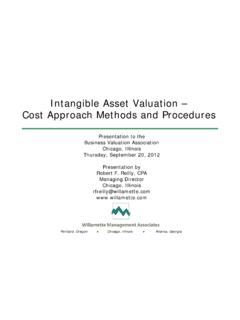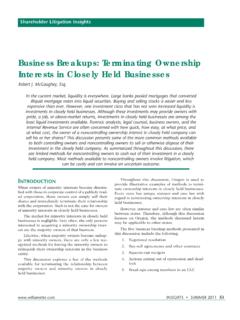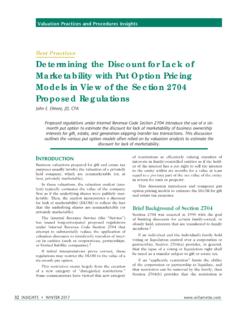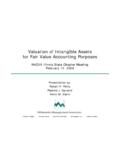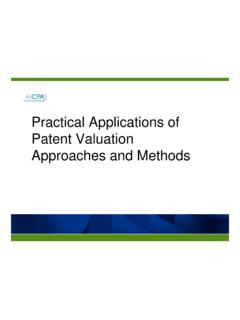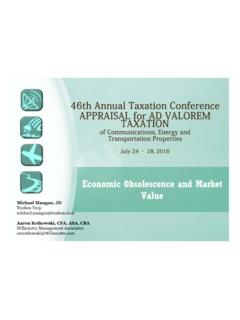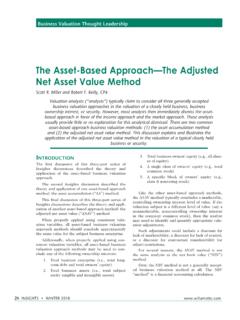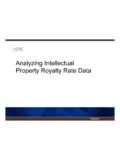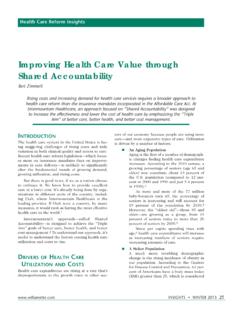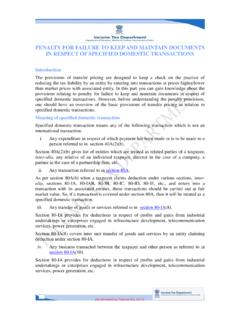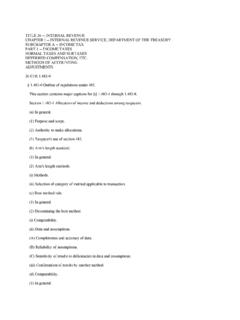Transcription of Valuation of Licenses and Permits - Business Valuation Firm
1 Www .willamette .com INSIGHTS AUTUMN 2014 53introductionValuation analysts ( analysts ) are often called on to estimate the value of many different categories of intangible assets. These intangible asset valua-tion analyses may be performed for various gift tax, estate tax, and generation-skipping tax taxation-related valuations can be per-formed for planning, compliance, and controversy purposes. This discussion focuses on valuations related to the Licenses and Permits category of intangible the generally accepted intangible asset valu-ation approaches ( , the market, income, and cost approaches) may be applicable to the valua-tion of this intangible asset category. This discus-sion presents illustrative examples of the applica-tion of the income approach and the cost approach to the Valuation of two common types of Licenses and part of the intangible asset Valuation process, the analyst performs a review of the terms of the license or permit.
2 In addition, the analyst performs an assessment of the existing industry and market conditions with respect to the subject license or due diligence procedures allow the analyst to determine the economic benefits, if any, provided by the license or permit. To the extent that the aforementioned due diligence results in the conclu-sion that the license or permit conveys an immate-rial economic benefit to the owner/operator, then that intangible asset may have little or no discussion presents examples both of busi-ness Licenses and Permits and of private and intel-lectual property Licenses . In addition, this discus-sion summarizes many of the factors that the ana-lyst considers when preparing a license or permit EnsEs and pErmitsFor purposes of this discussion, a license may be defined as governmental permission to perform a particular act or to conduct a particular Business or occupation.
3 A license may also defined as a private grant of the right to use an intellectual property, such as a patent or musical composition , a permit may be defined as a license or other document given by an authorized public official or agency to allow a person or Business to perform certain Licenses and Permits are used by gov-ernmental bodies to protect the public by ensuring that the Business owner/operator or the professional practitioner complies with applicable laws and Licenses , such as those granted to doctors, lawyers, accountants, and so on, are typically included in the Business license category of intangible assets. Intellectual property license Valuation of Licenses and PermitsRobert F.
4 Reilly, CPAV aluation Analysis InsightsValuation analysts are often called on to perform valuations of the Licenses and Permits category of intangible assets for various gift, estate, and generation-skipping tax purposes. This discussion describes the different types of Licenses and Permits , summarizes the applicable generally accepted intangible asset Valuation approaches and methods, and reviews the factors that Valuation analysts generally consider in the intangible asset Valuation . In addition, this discussion presents a simple illustrative example of a license and permit Valuation INSIGHTS AUTUMN 2014 www .willamette .comagreements (private Licenses ) are used to allow third-party licensees to exploit the intellectual prop-erty of the developer or on the nature of the Business and the regulatory environment in which it operates, the ownership of a license or permit may convey significant value to the owner/operator.
5 Licenses and Permits typically fall into a category of intan-gible assets sometimes referred to as contract intangible assets. This intangible asset category provides value to the owner/operator as a result of a written, legally enforceable contractual arrangement. In the case of a license or permit, the contractual arrangement is made with a governing authority, and it gives the owner/operator the right to conduct all or part of the subject contract intangible asset can result from any number of the agreements that are consummated daily between businesses and individuals. Most con-tract intangible assets can be categorized based on the source of the economic benefit giving rise to the existence of the intangible intangible assets relating to (1) the receipt of goods or services at an economically advantageous rate or (2) the granting of exclusive or protective rights to an entity are generally classified as receiver intangible assets relating to (1) the provision of goods and services at favorable rates (relative to the underlying cost of the goods or ser-vices provided) or (2) the securing of future benefit streams or provider rights for an entity are generally classified as provider Business license or permit may grant exclusive or protective rights to an entity.
6 That license or permit can be categorized as receiver based. The license or permit may secure future benefit streams or provider rights for an entity. It can be categorized as provider example, an owner/operator may secure a license or permit to protect its right to receive or import certain products. This license is an example of a receiver-based contract. An owner/operator may secure a license to sell regulated products such as pharmaceuticals. This license would be an example of a provider-based both cases, the license or permit grants the owner/operator the ability to generate an economic benefit from the Business most cases, this economic benefit has value to the owner/operator, and it may also have value to a third party seeking to purchase the license or permit intangible and Permits are typically categorized as contract intangible assets.
7 This is because they grant protective rights to an individual or entity owner/grantor. Such Licenses and Permits allow the individual or entity owner/grantor the legal right to conduct Business in a legally regulated setting. By virtue of the fact that any owner/operator satisfies the legal requirements to obtain a Business license or permit before conducting all or part of the sub-ject Business , these rights have value to the holder. Often, these rights may be conveyed to a third oF thE lic EnsEs and Permits intanGiBlE ass EtBusiness Licenses and Permits provide authorization for an owner/operator to operate all or a portion of the Business in a regulated environment. The relevant regulation may be promulgated by either governmental agencies or professional organiza-tions.
8 The purpose of such regulatory authorities is to police businesses or individuals that operate in the following list presents examples of common Business Licenses and Permits :n License to sell regulated goods, such as pharmaceuticalsn License to operate in regulated industries, such as health care, food service, or sale of firearmsn License to practice in a regulated profes-sion, such as medicine, law, or accountancyn License to sell alcoholic beveragesn Logging permitn Salvage permitn Construction permitn Environmental permitEnvironmental Permits are an important require-ment for businesses operating in many industries. For example, a Business entity may operate a facil-ity or equipment that may emit pollutants into the atmosphere from a stationary source.
9 In most jurisdictions, such a Business entity must obtain a permit before operating that facility or term license may also be applied to a private grant of the right to use some intellectual property, such as a patent, trademark, or musical composition Licenses , patent Licenses , and copy-right Licenses are examples of common types of intellectual property Licenses . Franchises, liquor www .willamette .com INSIGHTS AUTUMN 2014 55licenses, and hospital certificates of need are exam-ples of Licenses that permit the guardian of a certain type of addition, professionals and other service pro-viders are generally required to obtain a license in order to provide their services. These Licenses are typically not transferable.
10 However, such Licenses do have a value to the licensed practitioner. The amount of that license value is often an important issue in family law to valuE thE lic EnsEs and Permits intanGiBlE ass EtTypically, an individual or Business would not acquire an existing license or permit unless it was economically advantageous to do so. A change in either general industry or economic conditions sub-sequent to the original acquisition of the license or permit may exert a positive or negative impact on the value of an existing license or Licenses and Permits may be valued for purposes of a sale or conveyance to a third party. In certain cases, Licenses provided by governmental agencies are transferable to third parties, either on their own or as part of the sale of a Business .

